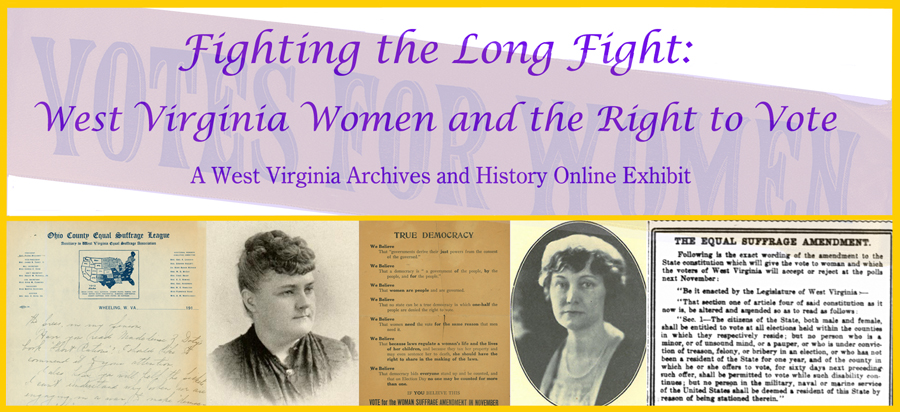

President of Equal Suffrage Association Speaks at Robinson Meet. PRECEDES JUDGE ROBINSON Want the Early Coming of the Day When West Virginia Motto Will Apply to All. Mrs. Frank N. Mann, president of the Huntington Equal Suffrage Association, spoke in advance of Judge Robinson at the Robinson rally at the city hall auditorium Friday night. Mrs. Mann said: “When I was informed as president of the Suffrage League of Huntington that I might place upon the platform tonight a speaker for equal rights I immediately wired state headquarters for an available speaker. Over the wires there came ringing back to me this laconic message from the state president: “‘No speaker available, do it yourself’.” “Accustomed to obey my superior officer, notwithstanding we have the Scriptures for it that a prophert [sic] hath no honor in his own country, verily they must have reckoned without the prophetess for I count it a signal honor to speak from this platform upon which there sits a bonafide judge of the supreme court and so many representative citizens of Huntington and Cabell county, and, may I not say, the possible governor of West Virginia, whom we have long honored as judge and jurist, long admired for his sterling Christian character and high moral standards and whom I have long loved as a personal friend.
“However, I am not here friends to discuss the political is[s]ues or to advance the cause of any political party, but I am here to present to you an issue which is of vital importance not alone to men and women of our beloved mountain state, but to our country at large, that is the emancipation of one class of our citizenship. “From 1861 to 1864 the bone and sinew of our country were in battle array against each other. We sacrificed the flower and strength of our land on altars of blood. Friend fought against friend; brother against brother, for a principle they believed right—that of the emancipation of a race, and to give to them the rights and privileges of that citizenship you deny the intelligent motherhood of our country. Gentlemen, 1861-64 freed a race; July 4, 1776, freed a sex. I ask you to make November 7, 1916, a red letter day in the history of West Virginia by freeing humanity. “I might go into many arguments for my cause, for I’ve the goods with me all right, but in the short time allotted to me I hardly deem it necessary to so intelligent and [sic] audience. The big men of our country in every walk of life have for years endorsed the movement. Men who have given deep thought and intelligent study to the essentials of a great democracy believe that our ideal form of government will never be attained until everyone has been given a voice and representation in governmental affairs.
“Men and women are equally concerned in good and bad government; equally responsible for civic righteousness. “They tell me that the majority of women do not want the ballot, and I say to you that as long as one woman wants the ballot, she is, according to the spirit of the Constitution, and the declaration of independence, entitled to it. “They say that women ought not to be in politics and say to you that we are in politics today. The state is so much the overparent of the home that women cannot look after the home without the vote. The law says when my boy shall go to school; what books he shall study; what food he shall eat; what car fare he shall pay; when he shall be vaccinated or given serum; when he shall be punished by truant officer or the juvenile court; when he shall quit school. “It is through the franchise that I am told what to pay for my gas, water and light. “Men in equal suffrage states, suffrage has turned out to be a fortification for the home. It has developed better wives and better mothers and women have brought to their duties as citizens superior humanity and motherliness. When a woman says that all she wants to do for civic reform can be accomplished without ballot, you can know right then that she has done little and aspires to do less. “I grant you much has been accomplished, but who has done it? Verily I say unto you it is the woman who today is asking for the ballot.
“The indirect influence may avail, but it’s a long way to Tipperary. You can go to New York via Cape Horn, but I perfer [sic] the direct route of the C. & O. Much has been accomplished by diplomacy but more by the power of the ballot. “There will not be a new heaven or a new earth. We will make many mistakes, but I’d rather be free to do wrong than compelled to do right. “Already the men of twelve states have granted this privilege to their women, and although they have the init[i]ative and referendum not six men have been found to vote for the recall. “Men of West Virginia, I, as a woman of your own state, born and bred within her borders ask you—are the women of West Virginia less intelligent, less responsible, less honored or less loved than the women of the west? No! A thousand times no! “West Virginia is the first state to submit the amendment to the people; the first to break the solid south. Suffrage is coming men, you can’t stop it. The only thing you can do is to say where you will place your women in the march of progress, and I beg of you to make them leaders, not laggers. Freedom always has been born in the mountains. Give us our freedom and give to our state motto, ‘Mountaineers are always free,’ its full significance.”
|